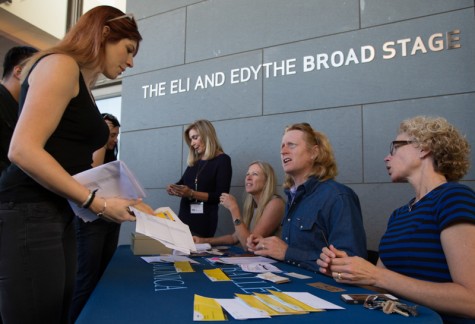"We were ignored": Associated Students pursue $10,000 worth of missing Nutcracker tickets.
If you’ve read the local papers or checked Santa Monica city event calendars, you may have heard of the massive success of the recent ballet performance of Tchaikovsky’s “The Nutcracker,” held this year from Nov. 27 to Dec. 6 at the Broad Stage. If you check the online press releases you would know that for the third year in a row, all performances were sold out – this time before the second week began. If you heard the underwriting for the show running on KCRW, you would know that the ballet was brought to the community by Santa Monica College and featured the SMC Symphony Orchestra that brought the magic of the Christmas classic to life with live music. But if you’re an actual SMC student, there’s a good chance that you didn’t know any of this. Moreover, you may not have known that the show wasn’t merely put on by SMC, but more specifically, has been brought to the community by the Public Policy Institute and Associated Students of SMC.
Why might the student body of SMC not know these things?
Because unless you checked the Special Events page on the SMC website, there was little advertising for the The Nutcracker actually on campus. No ads showed up in The Corsair, nor was there mention by AS itself at the “Feed Your Mind” event, where board members were handing out pizza to students on the campus quad on Nov. 26, the day before the run of “The Nutcracker” began.
AS had planned on spreading the word while distributing 250 tickets to students to see the show for free. These were tickets - worth a total of $10,000 at the box-office price of $40 per ticket - that AS was expecting to receive the week before the show began. This wasn’t a mere assumption – AS was told this by Dr. Richard Tahvildaran-Jesswein, the co-director of the PPI here at SMC, and the person who convinced the AS board to help fund the show to the tune of $25,000. It was the largest single expenditure the AS board made for their special events budget during the entirety of the fall semester.
“We were supposed to get [the tickets] at our last board meeting, and we did not,” said AS President Jesse Randel on Wednesday, Dec. 2, during the second week of the performance. “We are trying to track them down because it's a big deal to us."
Randel said he wanted to give Dr. Tahvildaran-Jesswein the benefit of the doubt until there was no doubt left, and AS tried to reach him throughout the rest of the week. By Friday, Dec. 4, when AS still hadn’t heard back he said, “Everybody knows that we're trying to get ahold of [Tahvildaran-Jesswein]. I don't want to throw him under the bus or anything, but it's pretty irritating."
The AS board had been convinced to fund the PPI’s production of The Nutcracker back on Oct. 19, after Randel and Tahvildaran-Jesswein had negotiated for months on how AS could fund the PPI’s 2015 Fall Forum that ran from Nov. 16 through Dec. 6. Due to changes in fiscal policy, AS could only easily fund singular events for department measures, so it was decided that they would grant PPI their now annual allotment of $25,000 by funding half of the SMC Symphony Orchestra’s fees for the show instead.
“They wanted money from AS to support a variety of programs” said Samuel Ross, the AS board’s Director of Budget Management. Ross and Randel said that they were fans of the mission of PPI - to grow the number of people who are aware of public policy and how policy is made through the Public Policy AA degree and the various events they put on throughout the year. Ross said, “One of the biggest justifications for me was not just the specific event but the totality of events that PPI puts out for students throughout the year, and assistance makes it easier financially for them to put on all these things they do."
Aside from two abstaining votes - one from Randel - only one member of the AS board voted Nay on the measure, Vice President Steve Maldonado. The rest of the AS board that spoke to the Corsair indicated that in addition to supporting the PPI’s mission, they had been counting on the free tickets as a factor in their decision to fund the initiative. Aside from defraying the cost of the expenditure, the tickets were a way for the event to more directly benefit a greater number of SMC members who have paid their AS fees.
“Basically, all of our money is student tax money,” said Randel. “So the only ethical way to spend that money is to ensure that it goes to benefit students in the best way possible."
Of course, what the “best way possible” might be is tricky to define. In terms of public relations for recruiting potential SMC students, assisting public events as beloved as The Nutcracker seems a resounding success. Whether one could say that the $25,000 AS spent on the measure has been a cost effective measure in terms of a direct benefit to the student body is much more questionable.
The SMC Symphony Orchestra, featured in most advertisements for the Nutcracker, is primarily composed of students and community players who sign up and pay their fees. Students in the SMC Symphony Orchestra cannot be paid by AS, or anyone within the school’s administration due to legal regulations.
The funds granted by AS are actually going to pay the fees of a number of professional musicians hired to play the event with them. Randel said the idea was to give the students a chance to play an event with talented professionals.
“Our orchestra is made up of a lot of students from SMC a number of community players, and also of course, professionals to tie us all together,” James Martin, conductor of The Nutcracker Orchestra, said.
In reality, this SMC Symphony Orchestra includes 16 students and seven SMC faculty members alongside 31 non-student/faculty musicians, according to The Nutcracker program. The program may be inaccurate however, as the production’s budget presented to AS lists funding for 44 professional musicians. With an orchestra comprised heavily of professionals, only a select few SMC musicians actually gained the opportunity to learn from playing with professionals. Calling it the SMC Symphony is misleading at the least.
Moreover, having a live orchestra was not a critical component for the staging of the show. Speaking to the Corsair, Livia Squires, publicist for the Westside School of Ballet said, "If we didn't have the live orchestra, if we didn't have the funding for that? Well we would use recorded music, which we have used in the past. Before we moved it over to the Broad, for many, many years Westside performed their Nutcracker with recorded music."
Randel and Tahvildaran-Jesswein finally made contact around Friday, Dec. 4, but at that point in time it was too late for AS to receive tickets for the sold out shows, forget distributing them amongst the student body. At this time, Tahvildaran-Jesswein informed Randel that there had been some distribution of complementary seats to SMC students in the Music and Dance departments.
“[Tahvildaran-Jesswein] said that he gave out 150 tickets to students and he can prove it,” Randel said. "That is great, but that doesn't really do anything for what our agreement was. Our agreement was still that we get 250 tickets to hand out and we never got those tickets and it's a big deal to us. Because we don't want to send the impression that, you know, you can make these verbal commitments and just renege on it."
Speaking to the Corsair, Tahvildaran-Jesswein stated that the issue was all a misunderstanding between PPI and AS. That where AS was expecting actual tickets to distribute amongst the student body, PPI had always intended to leave a number of seats open for SMC students to claim for free during performances held on Wednesday, Dec. 2, and Thursday, Dec. 3. On the subject, Tahvildaran-Jesswein said "I'm going to take full responsibility for the misunderstanding with that."
But what taking responsibility will mean remains to be seen. Five years ago Tahvildaran-Jesswein was under public scrutiny over ethical issues regarding conflicts of interest, and an an internal review board found that he had not violated institutional policy. In addition to heading PPI at SMC, Tahvildaran-Jesswein is also Guild President at the Westside School of Ballet which put on The Nutcracker, and both his son and daughter are cast in the show, according to the program.
Randel didn’t want to speculate on what the AS response would be in the future, but did express frustration with the lack of communication that had occurred between PPI and AS.
"We never got a response from him until after the shows had already started,” Randel said. “That's part of what's upsetting. Because we did follow it up, we chased it down, but because we tried to do it respectfully, we were ignored."
Tahvildaran-Jesswein insisted to the Corsair that even though he had been busy with the performances at the Broad stage, he was not a difficult man to reach as he teaches classes every day on campus. He did not want to comment about the attempts that Randel said AS had made to reach him, insisting that, “To not be accessible is - I don't think that's a fair characterization of anybody involved in Public Policy.”
After everything, Randel wanted to assure students that AS was not treating this lightly, saying “For our part in this, on the AS, we don't want students to think that we don't take the spending of their money seriously - we take it very seriously. It is a great big deal that we spend the student's money in the best interests of the students as ethically as possible. We want to fix this and we want to do everything we can as open and transparent as possible because it's a public organization.”
Click here to read the Corsair's Editor-In-Chief, Devin Page, give his input on these events.


